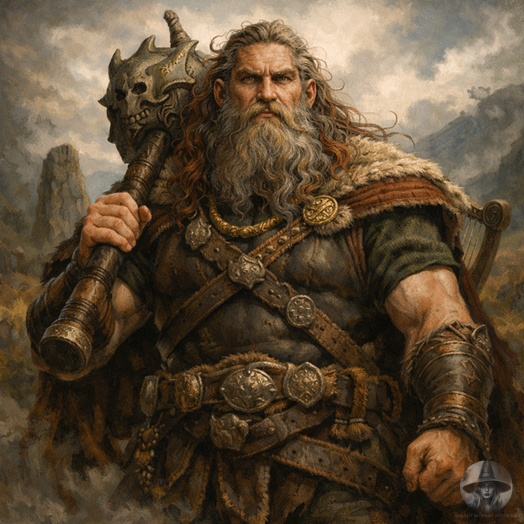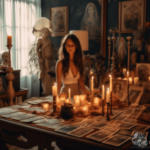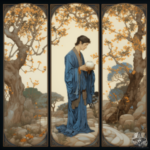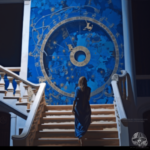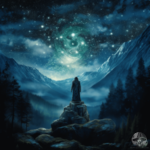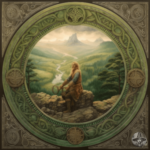Dagda, a central figure in Celtic mythology, is a god of many facets. Known as the 'Good God' for his benevolent nature, Dagda stands tall in the pantheon of Celtic deities as a symbol of strength, protection, and provision. His unique attributes, a magical club and a boundless cauldron, are not mere symbols but powerful extensions of his godly being. And in these symbols, we find a mirror reflecting the core values of the ancient Celtic society - unity, balance, and reverence for the cycles of life.
Beyond the symbols and tales, Dagda's story is a network of intricate relationships with other gods and goddesses, weaving a vibrant tapestry of divine kinship. As the All-Father, his interactions with other deities not only contribute to the richness of Celtic lore but also underscore the interconnectedness that is so fundamental to Celtic spirituality.
Thus, an exploration of Dagda's tale is an exploration of ancient Celtic society itself, offering an insight into their worldviews, their values, and their profound spiritual understanding. As we delve deeper into his story, we encounter a world where the physical and the metaphysical converge, where the powers of nature are revered, and where the divine permeates every aspect of life.
The Tale of Dagda
Dagda's tale is as captivating as it is enlightening. His attributes - a magical club and a boundless cauldron - aren't merely objects of power but symbolize deeper truths about life, death, and provision. His club, capable of both taking and granting life, is a stark reminder of life's inherent duality, a concept deeply rooted in Celtic belief systems. It serves as a symbolic representation of the constant ebb and flow of life and death, the cyclical nature of existence that the Celts deeply revered.
His cauldron, on the other hand, is a symbol of abundance, always full, never depleting. It captures the Celtic ethos of generosity and communal well-being, echoing the communal structure of ancient Celtic villages and clans. The Dagda, with his inexhaustible cauldron, represents the ideal of a benevolent provider, a nurturing force ensuring that no one in the community goes hungry.
However, the tale of Dagda is not just about a god and his magical objects. It's also about the people who worshipped him, the stories they told, and the spiritual values those stories embodied. These tales, passed down through generations, offer us a glimpse into the Celtic world, steeped in magic, mythology, and a profound understanding of the natural world.
Who celebrated Dagda?
The worship of Dagda and the rich Celtic pantheon of gods and goddesses primarily originated in Ireland and spread to parts of the United Kingdom, particularly Wales, and Scotland. The tales and lore of Dagda and other Celtic deities are especially prominent in Irish mythology, making Ireland a significant center for Celtic spiritual traditions.
However, the influence of Celtic culture and its spiritual beliefs extends far beyond these regions. Historical Celtic migrations led to the spread of their cultural and spiritual practices across various parts of Europe. Today, elements of Celtic spirituality, including the veneration of Dagda, can be found in contemporary Pagan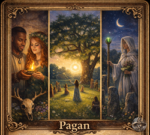 Pagans are people whose spiritual identity exists outside the dominant Abrahamic religions. The term includes a wide range of cultural, ancestral, and spiritual paths, often connected through reverence for nature, cycles, and lived relationship with the world. →→ Click for more details ←← practices, making Dagda's worship a truly global phenomenon.
Pagans are people whose spiritual identity exists outside the dominant Abrahamic religions. The term includes a wide range of cultural, ancestral, and spiritual paths, often connected through reverence for nature, cycles, and lived relationship with the world. →→ Click for more details ←← practices, making Dagda's worship a truly global phenomenon.
In the modern world, there is a resurgence of interest in Celtic Paganism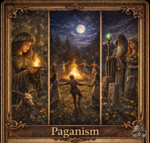 Paganism is a diverse family of spiritual traditions rooted in pre-Christian, nature-centered practices. It honors cycles of time, relationship with the land, and multiple expressions of the sacred across cultures and history. →→ Click for more details ←←, with many practitioners embracing the ancient pantheon. Dagda, with his profound symbolism and compelling attributes, continues to be a revered figure in these practices. His tale resonates with modern Pagans, symbolizing the ideal balance of strength and compassion, protection and provision, thereby ensuring his place in contemporary spiritual landscapes.
Paganism is a diverse family of spiritual traditions rooted in pre-Christian, nature-centered practices. It honors cycles of time, relationship with the land, and multiple expressions of the sacred across cultures and history. →→ Click for more details ←←, with many practitioners embracing the ancient pantheon. Dagda, with his profound symbolism and compelling attributes, continues to be a revered figure in these practices. His tale resonates with modern Pagans, symbolizing the ideal balance of strength and compassion, protection and provision, thereby ensuring his place in contemporary spiritual landscapes.
Dagda's Role and Significance
As a god of protection and providence, Dagda's character paints a vivid picture of an ideal leader - one who is not only a fierce warrior but also a nurturing provider. He embodies the Celtic societal values of safeguarding the community and ensuring its prosperity. But Dagda's role extends beyond the societal - he symbolizes a harmonious balance between contrasting elements, seamlessly blending strength with compassion.
Dagda's association with the Earth and water, symbolized by his club and cauldron, underscores the Celtic reverence for the natural world. His stories often reveal his intimate relationship with nature and its cycles, echoing the Celtic belief in the sacredness of the natural world. For the Celts, nature was not merely a resource to be used, but a sacred entity to be respected and revered.
His interactions with other deities further highlight his pivotal role in the Celtic pantheon. These tales weave a complex network of relationships that mirror the interconnectedness of life - an essential tenet of Celtic spirituality. Dagda's stories, in essence, serve as allegorical narratives, emphasizing the delicate balance of life, the sacredness of nature, and the importance of communal harmony.
Relationships
Dagda's relationships with other deities are a significant aspect of his character and role within the Celtic pantheon. Often referred to as the "All-Father" in Celtic mythology, Dagda was associated with several goddesses, his relationships with them adding layers of complexity to his character.
His most notable relationship was with the Morrigan, the goddess of war and fate. Their encounter, as described in the Irish mythological text, The Second Battle of Mag Tuired, reveals a passionate affair on the eve of a significant battle. Following their tryst, Morrigan promises to aid Dagda in the upcoming fight, showcasing the intricate alliances and interactions among the Celtic deities.
In addition, Dagda was known to have fathered several children, further solidifying his status as the All-Father. Among his offspring were figures like Brigid, the goddess of fire, poetry, and wisdom; Aengus, the god of love and beauty; Bodb Derg, the king of the Tuatha Dé Danann; and Midir, a significant figure in Irish myth. Each of these relationships offers further insight into Dagda's diverse roles and influence within the Celtic pantheon.
Dagda’s Lasting Wisdom
Dagda, in all his complexity and multifaceted nature, offers a compelling reflection of Celtic culture and spirituality. His tale reveals a society that revered balance, upheld unity, and acknowledged the cyclical nature of existence. His role as both a fierce protector and a nurturing provider echoes the societal values of the Celts, underscoring the harmony of contrasting qualities.
Today, Dagda continues to inspire modern interpretations of Celtic paganism, his story and symbolism resonating with those seeking a spiritual path rooted in nature, balance, and interconnectedness. As we navigate the complexities of our modern world, Dagda's tale serves as a reminder of the timeless wisdom of our ancestors, urging us to honor the cycles of life, respect the natural world, and uphold the values of community and provision.
So, next time you find yourself under a star-studded sky or feel the heartbeat of the Earth beneath your feet, remember the Good God Dagda. Let his story inspire you, guide you, and remind you of the profound wisdom that lies at the heart of Celtic Paganism.
